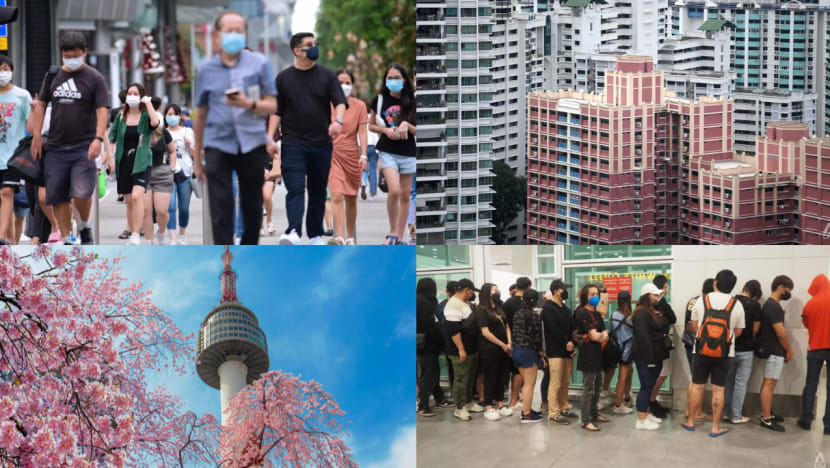Daily round-up, Sep 30: COVID-19 cases rise in Singapore; property shares fall after cooling measures; South Korea lifts restrictions for inbound travellers

From top left to right, to bottom left and right: People wearing masks on Orchard Road in Singapore (File photo: CNA/Gaya Chandramohan); HDB flats in Singapore (File photo: CNA/Calvin Oh); Namsan Tower in Seoul, South Korea (Photo: Getty Images Pro); Malaysian victims of overseas job scams arriving home from Cambodia on Sep 9, 2022 at Kuala Lumpur International Airport (Photo: CNA/Rashvinjeet S Bedi).
Let's get you up to speed with the day's stories.
Daily COVID-19 cases in Singapore increase by up to 40% week-on-week: MOH
Singapore has recorded a 35 per cent to 40 per cent week-on-week increase in COVID-19 daily cases, translating to 900 to 1,000 more infections every day, said the Ministry of Health (MOH) on Friday (Sep 30).
There has been no indication that the increase in cases has led to more severe diseases. There has also been no significant impact on Singapore’s healthcare system due to this higher number of daily infections.
The Omicron variant BA.2.75 or “Centaurus” accounted for about a quarter of all daily infections.
MOH said the main reason for the increase in cases is most likely due to social mixing and gatherings, and relaxing of rules on masks.
The proportion of reinfections also increased from about 6 per cent of all reported cases from the beginning of September, to about 10 per cent this week. However, they only account for a small proportion of the rise in cases and "are not the main driver for the higher number of cases", MOH said.
It says it expects higher numbers of cases over the next few weeks and will continue to monitor the situation closely.
Shares of Singapore property developers fall after new cooling measures
Shares of Singapore property developers took a hit on Friday morning (Sep 30) after cooling measures were announced late on Thursday.
The tightened housing loan limits will help homeowners exercise prudence in their purchases amid rising interest rates and cost of living, analysts said.
Another measure requires private property owners to wait 15 months before they can buy an HDB resale flat.
Analysts CNA spoke to say the wait-out period is a "surprising turn of events", but will likely serve as "a form of deterrence for buyers with deep pockets". This ruling will likely "curb demand for private property owners who are looking for larger spaces in the HDB resale market", said one analyst.
Here's what you need to know about the new property cooling measures and how they will affect your ability to take up home loans.
South Korea removes COVID-19 PCR testing for inbound travellers from Oct 1
South Korea will remove its on-arrival COVID-19 polymerase chain reaction (PCR) testing requirement for inbound travellers starting from Oct 1 (Saturday).
The move means all COVID-19 restrictions on inbound travellers will be lifted.
The South Korean government has been easing restrictions recently as infections in the country gradually decline. However, it added that it could step up restrictions again if it sees the emergence of risky virus variants and the global virus situation changing.
174 Malaysian job scam victims still stranded overseas, say police
A total of 174 Malaysians who are victims of job scams are still stranded in foreign countries, said Malaysian police.
Police secretary Noorsiah Saaduddin said they received 224 reports made by family members and friends of 284 scam victims. Of the total, 110 Malaysians have been rescued.
She advised Malaysians to be careful when accepting overseas job offers on social media and to verify the authenticity of the employers with the Ministry of Foreign Affairs.
Operating out of countries like Cambodia, Laos and Myanmar, the scam syndicates generally use social media platforms such as Facebook and Instagram to advertise high-paying jobs overseas. Once the victims are lured overseas and held against their will at the scam compounds, they are then taught and forced to cheat people online.












